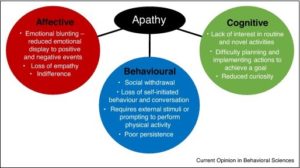A monthly article brought to you by Senior Services Memory Support Programs
If you have a loved one with dementia, it is important to understand that up to 90% of those living with dementia will develop apathy during their journey. What is apathy? It can be defined as being lethargic or having a lack of energy, interest, concern, motivation, feelings, or emotions. This can be one of the most frustrating and challenging symptoms of dementia. Without understanding apathy, it is easy to think that a loved one has become lazy or depressed, which is not the case. People with apathy do not typically have feelings of sadness or hopelessness. They might simply appear or feel uninterested, disengaged, or unexcited.
 There are three types of apathy in dementia.
There are three types of apathy in dementia.
- Affective Apathy: This type of apathy involves a lack of emotions, the appearance of indifference, and the absence of empathy. The person may appear not to care about others or lack the warmth with which they used to greet you. They might appear unaffected emotionally, rarely showing happiness or sadness about what is happening around them.
- Behavioral Apathy: Apathy in behaviors include physical inactivity and tasks left uncompleted. Someone experiencing behavioral apathy might not walk around very much at home and ignore tasks such as housekeeping or laundry, even though they are physically able to perform them.
- Cognitive Apathy: Cognitive apathy includes the lack of initiating speech and mental activity as well as the absence of interest in others’ activities. If someone is experiencing cognitive apathy, they might need prompting in conversation and may appear “zoned out” and uninterested in what is occurring around them.
Unfortunately, there are no medications to treat apathy and anti-depressants will not help. Coping with apathy can include:
- The caregiver having a good understanding of apathy and having realistic goals
- Setting up an easy daily routine
- Keeping your loved one active with family, friends, and the community
- Stating things differently, such as: “It’s time to go for our afternoon walk”, instead of asking “Do you want to go for a walk.” This technique can be used for a number of situations
- Focusing on things your loved one still enjoys (food, grandchildren, reminiscing, music)
When you start to notice memory changes, seeking early detection is key. Senior Services offers an array of memory support programs including confidential memory screenings to obtain a cognitive baseline, early memory loss programs, and educational classes along with support from Seasons Adult Day Health Services. If you or someone you know is experiencing increasing changes with their memory and could benefit from additional services, please contact Amy Sheridan, Family Support and Activity Manager at 989-633-3764.
Check out our section, Our Mind Matters, next month as we discuss “saving face”.

